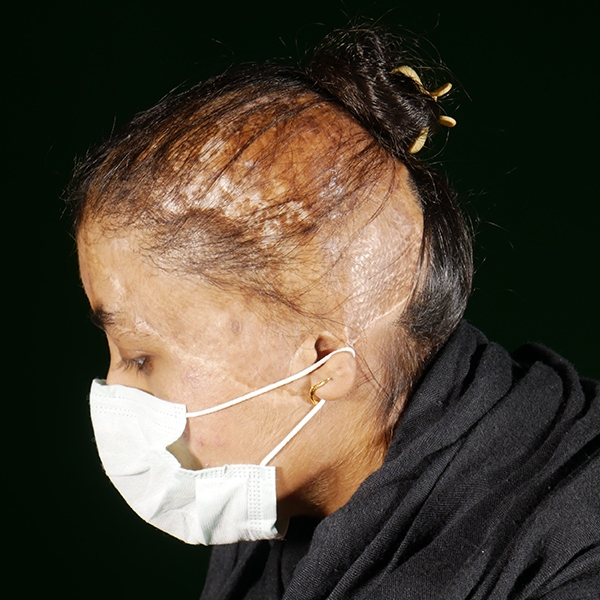Kinza, 18, met with an accident in 2009 which badly hurt her skull. A resident of Samanabad area in Lahore, she belongs to a poor family so her parents contacted Depilex Smileagain Foundation (DSF), a non-governmental organization (NGO), to help her get skull surgeries.
Though the organization said it could not fund her treatment because it treated only acid burn victims, its staff took her pictures and recorded a video in which she was made to say: ‘Thank you Depilex Smileagain Foundation and thank you Masarrat Apa for saving my life’.
Masarrat Apa’s actual name is Masarrat Misbah and she is the chief executive of DSF.
‘They [DSF] said they will show the video to some donors and NGOs and raise some funds for me but they never contacted me again,’ Kinza tells Sujag. She has undergone five surgeries so far and requires some more but she did not get a single penny from DSF. The only thing that the organization gave her was a hair extension wig to cover her scars.
When Sujag met her a few days ago, she thought we also wanted to record a promotional video for DSF so her first response was to parrot a thank you note to the organization. She seems to have memorized it.
Suman Ali was also made to record a similar video statement, expressing gratitude for DSF and Masarrat Misbah.
She registered herself with DSF after surviving an acid attack in Lahore in 2016. The organization took her to a few doctors for her examination and got her the job of a receptionist at a makeup salon. She, however, says she was never paid any salary for her work and was told that it was supposed to be voluntary work in lieu of the help she was getting from DSF.
She also tells Sujag that DSF would ask her to participate in television shows. In 2016, she was taken to a morning show where she was told to cry on camera. ‘I was not comfortable with that,’ she says, so she was relegated to the audience.
DSF and Masarrat Misbah, indeed, have been regular fixtures at television shows over the past decade and a half due largely to her personal and business connections. She owns a Pakistan-wide network of high-end makeup salons and her paternal family, including herself, is the owner of a Karachi-based drug manufacturing company. One of her uncles is a renowned hockey player who subsequently held important positions in the management of the sport.
Her father, two brothers and her sports star uncle are all listed among the founding members of DSF and two of them are also among its three directors -- Masarrat Misbah herself being the third one.
Local and foreign media outlets have also published and broadcast many laudatory reports about her and DSF over the last many years, often calling her the savior of acid burn victims in Pakistan.
A 2010 Al-Jazeera news report about acid victims in Pakistan -- that won an international award -- refers to DSF as a ‘Pakistani foundation [that] helps victims to rebuild scarred faces and lives.’
A BBC report -- 100 Women: The salon helping acid attack victims -- similarly stated in 2014: ‘In the last 10 years, Masarat has helped hundreds of acid attack victims. With donations, she pays for their medical treatment and then trains them for the workplace. Some now work at her salon.’
A Pakistani newspaper, Pakistan Today, too, published an article in 2016 that eulogized Masarrat Misbah as ‘a messiah for acid burn victims’.
British newspaper Guardian also stated the same in a report published in July 2020. Talking about acid burn victims being reportedly helped by DSF, it said that ‘a job scheme for women who may otherwise be shunned as outcasts is giving many the opportunity to rebuild their lives’.
The government, too, gave a Pride of Performance Award to Masarrat Misbah in April 2010. In an interview with daily Express Tribune, this is how she commented on the award: ‘I am a very patriotic person and for me having my efforts recognized nationally by the government was a very proud moment.’
Accusations of financial fraud and victim exploitation, however, have haunted DSF almost since the beginning though they could not generate more than three news reports. Masarrat Misbah continues to dismiss these allegations as a smear campaign launched by a disgruntled former business partner.
These news reports were all published in Pakistani media outlets - The News, Herald and Waqt News – and accuse Masarrat Misbah and DSF of committing financial fraud and exploiting acid burn victims.
Herald magazine, for instance, wrote in February 2010: ‘Allegations of non-transparency, mismanagement, misuse of money and exploitation of prospective donors have lost the Depilex Smileagain Foundation (DSF) support of its main backers and donors.’
Daily The News reported something similar in May 2010: ‘The scandalous performance of the NGO that has won Musarrat the Pride of Performance award, also reflects on the work of so-called local charity organizations, feeding on foreign taxpayers’ money with little deliverance.’
Referring to these reports, Masarrat Misbah tells Sujag: ‘It doesn’t bother me because at the end of the day my name stays unsullied just like all good always prevails and the evil dies down.’
Sujag has been looking into the allegations against her for the last several weeks as part of its series on acid burn victims in Pakistan. Only a few days earlier, we could access the report of an investigation conducted about DSF by the Security Exchange Commission of Pakistan (SECP) on the directive of the human rights cell of the Supreme Court of Pakistan. This report reiterates all the allegations leveled previously on DSF in detail and presents an eye-opening account of its financial affairs under the following categories:
Lack of transparency in local and foreign donations
Misuse of donation money
Discrepancies in accounts
Absence of complete patient record
No proof of donations for a proposed hospital in Multan
Financial irregularities like extending loan to Depilex Private Limited and other individuals
(More details of these allegations will be given later.)
Fishy from the start?
Fakhra Younus, a young girl living in Karachi, was burnt with acid in 2001 by Bilal Khar, the son of a former chief minister of Punjab, Ghulam Mustafa Khar. The incident created a shockwave of anger across Pakistan, with news headlines demanding the attacker’s trial and the victim’s treatment.
Writer and social activist Tehmina Durrani, who also happens to be a former wife of Ghulam Mustafa Khar, subsequently took Fakhra to Italy for her treatment. Their travel received so much media attention that Time magazine published a detailed story about the duo – with their photo carried on the cover.
Encouraged by the support that she received abroad, Tehmina Durrani thought of setting up a Pakistani chapter of Smileagain Foundation Italy – a renowned NGO working against acid attacks across the world. She then suggested that Masarrat Misbah take up the task of setting up and running the organization in Pakistan.
This is how Depilex Smileagain Foundation – or DSF for short -- came about. Possessing more than 22 million rupees in its bank accounts, it claims to have helped more than 700 burn victims over the last many years.
Manzar Mian, a founding director of DSF and a former partner in Depilex Private Limited, the salon company that Masarrat Misbah owns, has been critical of the DSF’s financial management since the start. ‘I was taken aback when it showed a negative balance of around 4,400,000 rupees even before it started its operations,’ he says in an interview with Sujag.
He also claims the donations collected in cash at fundraising events were never deposited in banks and alleges that most of the money raised for the victims was extracted from the DSF accounts for Masarrat’s personal use. ‘I was shocked.’
Manzar Mian says he left DSF because of the massive ‘fraud’ that the organization was committing – though Masarrat Misbah alleges that he has been ‘maligning’ her due to a long-running business disputes with her.
Manzar Mian also filed a complaint with SECP in January 2009 about DSF’s financial affairs but he says ‘no action was taken’. He then collected all the documents that he could and has since then been trying to lodge a corruption case against DSF – again ‘with no outcome’.
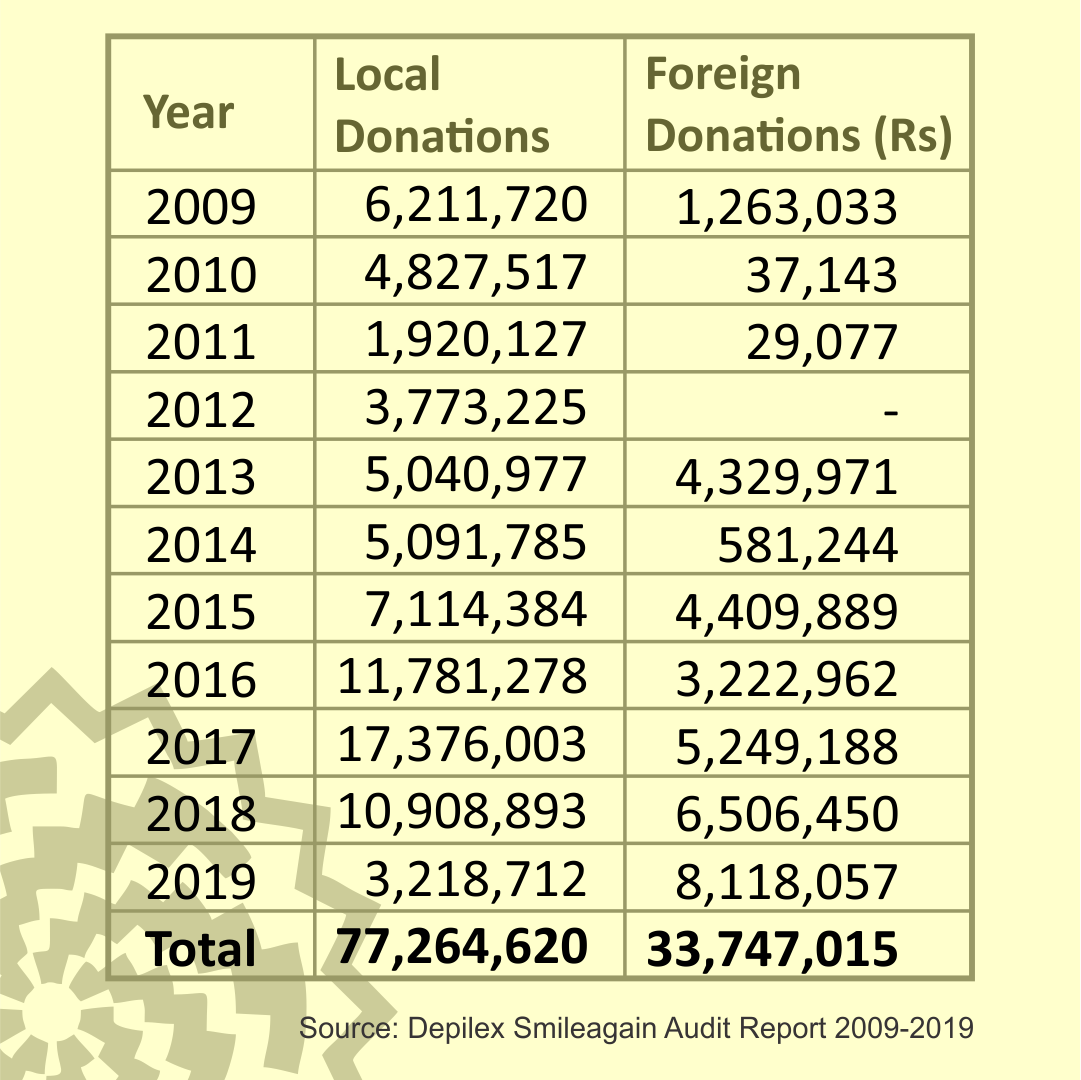
According to him, Masarrat Misbah’s reputation, personal links and control over media narrative have helped her keep her ‘corruption’ under the wraps.
Another early allegation against DSF came from its original sponsor.
In 2009, Clarice Felli, Smileagain Foundation Italy’s president, held a press conference which could not be aired in Pakistan due to a terrorist attack. In a press release that she issued at the occasion, she accused Masarrat Misbah of committing massive financial wrongdoings, indulging in double accounting and creating fake victims.
“During my stay I met a number of patients, ex-employees and volunteers of DSF. It was apparent that nothing was being done for the patients I met. I was shocked to meet the accountant of the DSF, a charity, who had been arrested for allegedly stealing the complete record of accounts. I also discovered that DSF is under investigation by the SECP. All the volunteers that I had come to know over the years were no longer associated with DSF,” Clarice Felli stated in the press release.
She, then, severed all her links with DSF.
What the report reveals
Sometime between December 2018 and January 2019, the Supreme Court’s human rights cell wrote to SECP as to why it has not initiated any inquiry on the basis of Manzar Mian’s complaint against DSF. Responding to this query, SECP launched and investigation in January 2019 and completed its report by September that year.
For some inexplicable reason, however, it has not made that report public.
Because of this secrecy, Masarrat Misbah could claim during an interview with Sujag that SECP ‘could not find any financial or other wrongdoing’ in her organization’s work. She went to the extent of saying that ‘the SECP chairman said at an event earlier this year that many bogus complaints are filed with his organization which take a lot of time to investigate but later no fraud is found and he quoted our case in this regard as well.’
Sujag could not find any media reporting of this statement by the SECP chairman. When asked if she could provide an SECP document that shows that DSF has been cleared, Masarrat Misbah refused to provide any.
Sujag also sent her an email after getting hold of the SECP report, asking her some follow-up questions, but she has not responded so far. Her personal secretary, in fact, has made any further communication with her impossible, saying that she is ‘extremely busy and has one interview after the other’ lined up.
This report offers evidence of large-scale financial wrongdoings in the handling of DSF’s accounts. For one, it says that DSF is not registered with the Pakistan Centre of Philanthropy which is authorized by the Federal Board of Revenue (FBR) to issue tax exemption certification after monitoring the performance of NGOs – thus its claim of being exempt from income tax stands on tenuous grounds.
Some other financial malpractices reported by the investigators to be prevalent at DSF are summarized below:
1. Lack of transparency in local and foreign donations
The SECP investigators state that DSF collected a lot of cash donations but, they say, the organization did not put in place a strong financial mechanism to handle these donations in accordance with relevant rules and regulations. Their report states:
‘There is no system in place to ensure that cash donations are appropriately accounted for, adequately accounted for, adequately recorded and are periodically deposited in the bank account. It is a matter of great concern that despite lapse of more than a decade, Foundation has failed to establish any internal controls on cash donations.’
It also adds: ‘…in fact, there are no controls over collection of cash. Hence, there is no solid record of the donations put in cash boxes placed by the Foundation at various locations across cities.’
The report points to a number of entries that appear in DSF’s donation ledgers against which no amount of money is recorded. The detail of such entries is as follows:
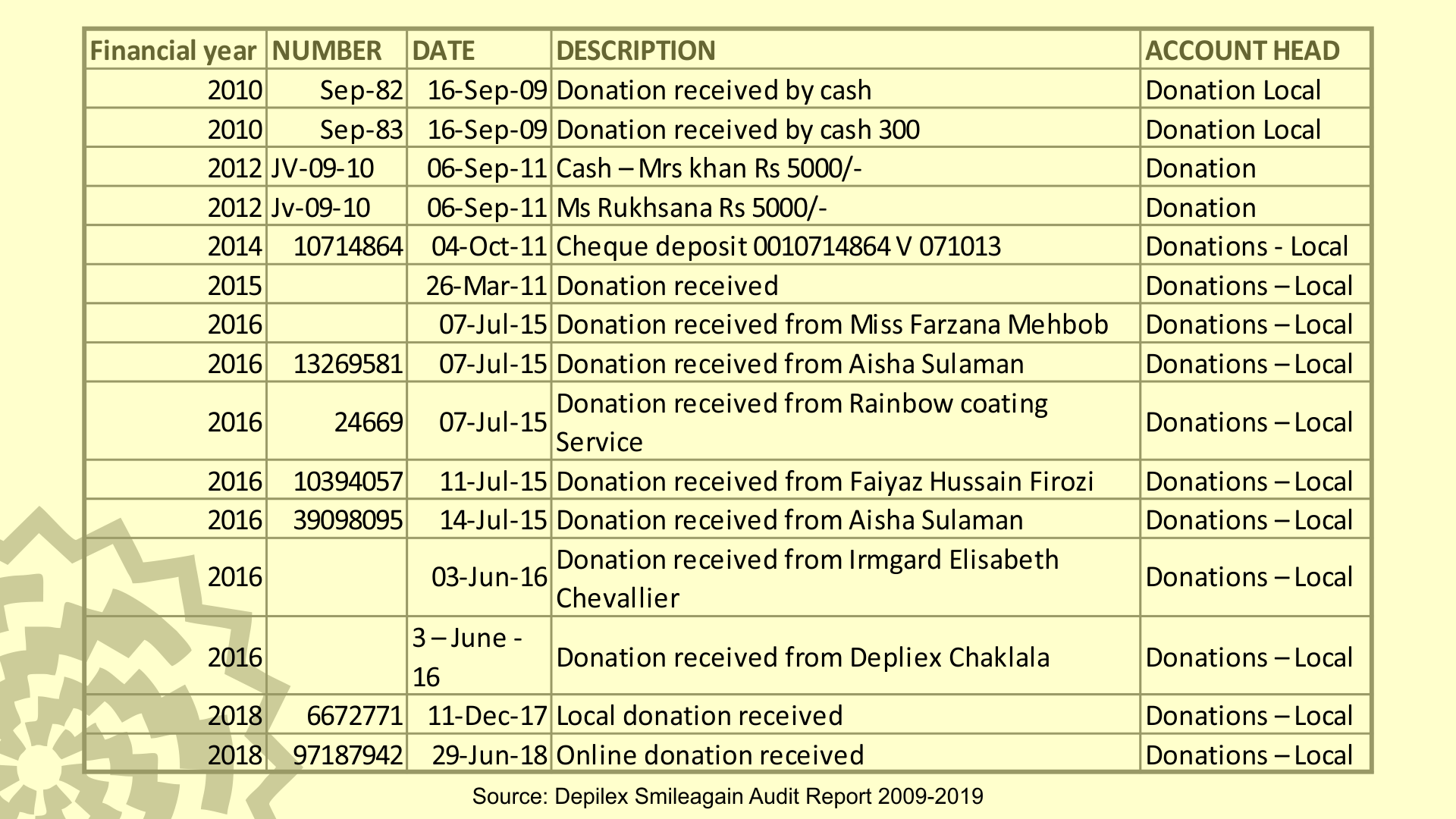
The report quotes the DSF management as saying that ‘these entries primarily represent system error’ but the investigators do not appear to agree. They, instead, observe that ‘there is [an] increased risk that [this] amount may have been misappropriated…’
In her interview with Sujag, Masarrat Misbah also denied receiving foreign donations for DSF. She said her organization does not get any international funding and most of the funds are given to it by her family and friends.
The SECP report, on the other hand, shows that a number of DSF fundraising activities were held outside Pakistan. Dr Sonia Pena – president of Sigo Adelate Foundation and a Spanish surgeon – confirmed to the investigators that DSF had conducted a fundraising event in Spain though she told them that her own organization did not give any cash donations to DSF.
The documents that DSF submitted at the Supreme Court state that foreign donations were received from Switzerland as well.
DSF’s own audit report also states that it received foreign donations worth 8,376,990 rupees in 2019 alone. The same audit report shows that DSF maintains a US dollar bank account which had over 13 million rupees in it in 2019.
The SECP audit for the years between 2005 and 2019 shows the following detail of donations received by DSF:
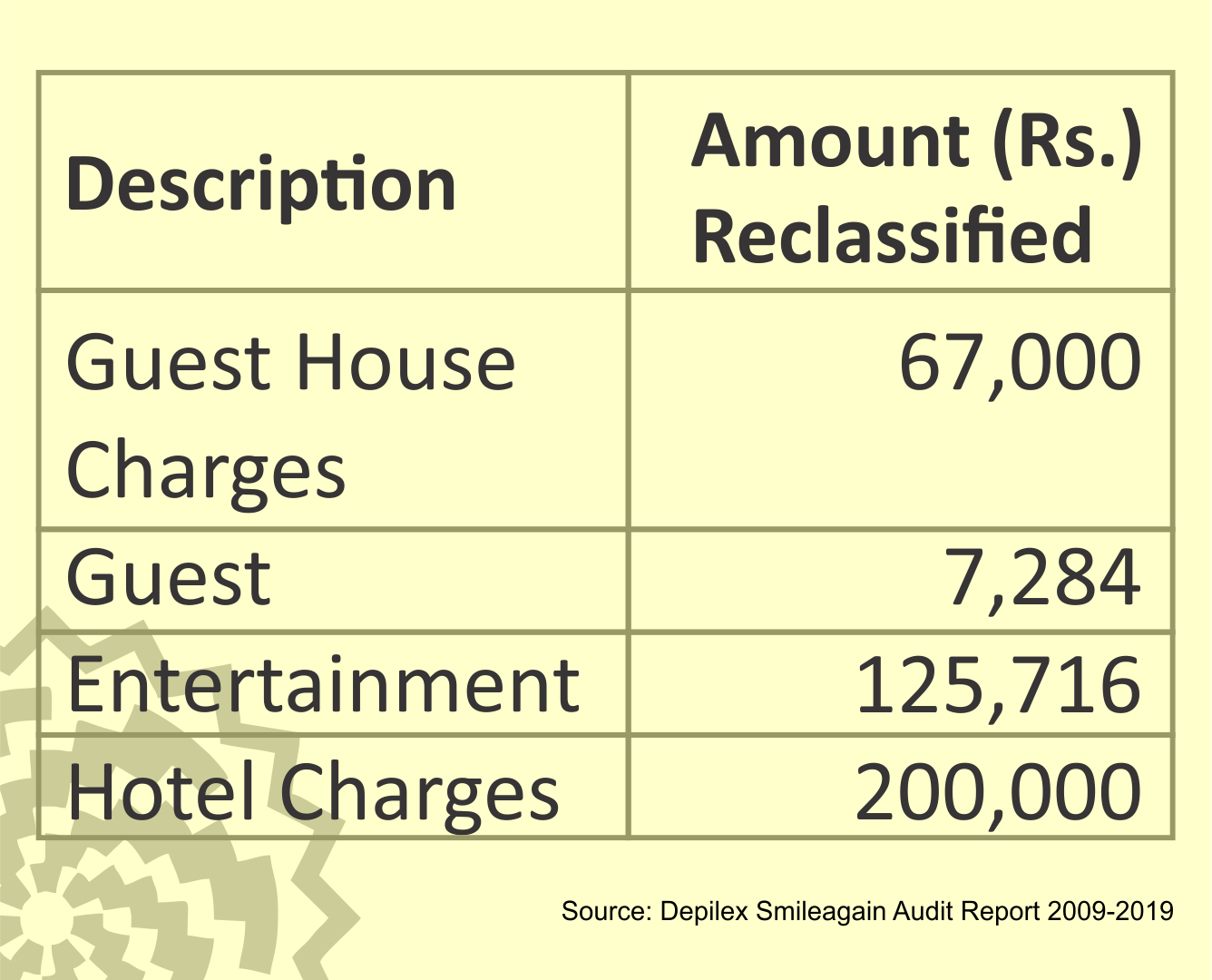
2. Misuse of donation money
DSF is also alleged by SECP report to have used donor money for activities unrelated to its work – including the purchase of a luxury vehicle for its chief executive’s personal use. The money for the purchase of the vehicle was recorded in DSF accounts as a loan to Depilex Private Limited in violation of the rule that prohibits the transfer of money from a non-profit organization to a for-profit business. The report, therefore, states: “Donor’s money is being utilized by private company owned by the Chief Executive”.
The investigation has also found a number of transactions which either misquote expenses or mention expenses incurred on something other than DSF’s stated purposes. Some of these are given below:
Combined Military Hospital (CMH) Rawalpindi did not confirm vouchers amounting to 180,610 rupees that DSF had submitted to the investigators.
The hospital acknowledged that it treated various patients on the behalf of DSF but it said the expenses shown by the organization were much higher than the actual costs.
National Hospital & Medical Centre, Lahore, a private medical facility, did not verify bills worth 485,000 rupees claimed by DSF as expenses on the treatment of patients there.
DSF misquoted an expense worth 200,000 rupees as surgery when it was actually spent on a promotional event in Islamabad. The details of this expense are as follows:
3. Discrepancies in accounts
The SECP report cites multiple instances in which DSF seems to have forged expense receipts. To cite just one of them, DSF reported that it had paid 163,215 rupees to A H Traders for the purchase of medicine in connection with surgeries done at CMH. The payment was made in July 2014 but the date shown on the bill was of August 2014.
The bill, therefore, ‘appeared suspicious’ to the investigators so they decided to confirm its authenticity. When they sent a rider to the place mentioned on it as the office of A H Traders, he could ‘not find the whereabouts and reported that no such address exists on the given location.’
Summing up these allegations, the report states: ‘During scrutiny of record, it was observed that there are [a] number of medicine bills/invoices, which are on plain cash memo (readily available in market) without serial number, supplier name, address and paid stamp…it is also noted that the handwriting on a number of bills was similar.’
The report similarly alleges that DSF does not seem to be spending the donations in a justifiable manner. For instance, the report says, the total amount of donations the organization has received stands at about 111 million rupees but only 32 percent of that has been spent on patient care and support.
A part of the expenditure shown as ‘workshop expenses’ is also seen by SECP to be suspicious. Several organizations involved in these workshops are reported to have stated that they did not charged DSF any money for providing their services but they are shown in DSF accounts to have been paid.
Also Read
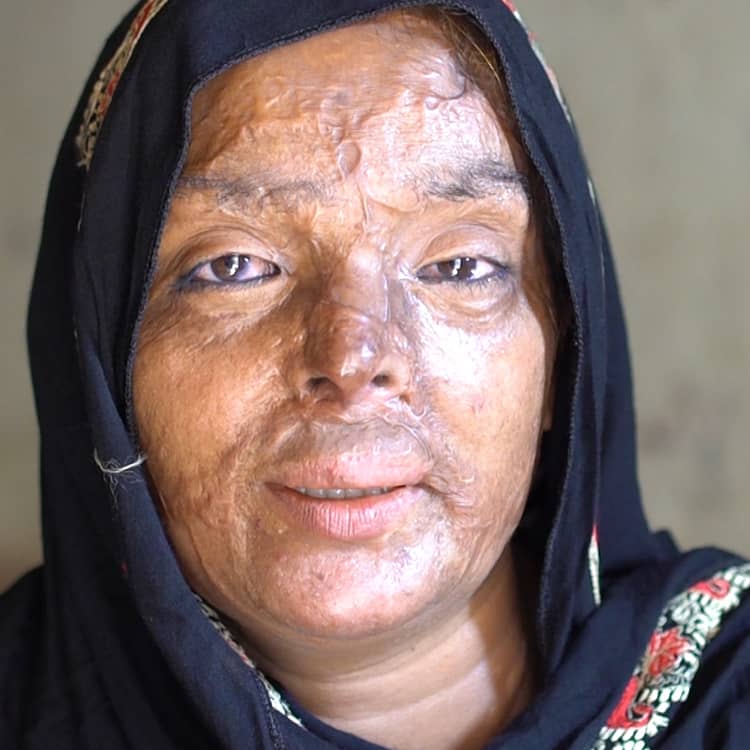
Permanently damaged: The never-ending prejudice and isolation faced by acid attack survivors
4. Absence of complete patient record
DSF is reported to ‘lack [a] patient management system’. This is what SECP says in this regard: ‘Patient files with complete history and all related expenses incurred on their treatment including patient support were not available.’
This is in line with allegations by people like Manzar Mian that DSF exaggerates the number of patients it has treated and also over-states the overall number of acid victims in Pakistan. The data provided by DSF to Sujag seems to have the same problem. It shows 101 new patients registered with it in 2019 but the Acid Survivors Foundation, another NGO working for the welfare of acid attack victims, registered only 47 cases in the same year. Similarly, Nishtar Hospital’s Burns Unit in south Punjab region, which has the highest incidence of acid attacks in Pakistan, reported only 21 cases in that year.
Manzar Mian also accuses DSF of not having the records of all the 700 victims that it claims to have registered. He says: ‘The organization has a few girls whom it presents at every fundraising event. Some of them contacted me too and complained that their pictures were taken and videos were made but their treatment was never funded by DSF.’
In her interview with Sujag, Masarrat Misbah refused to share the details of the patients DSF has treated, saying this was ‘confidential’ information. SECP investigation team, too, could not find those details and, therefore, states:
‘Patient files with complete history and related expenses on each patient were not available. The investigation team was unable to quantify the exact amount spent on each patient due to the absence of the aforesaid information.’
5. No proof of donations for the hospital in Multan
For years, DSF has claimed that it is building a state of the art hospital in Multan – a project estimated to cost 380,000,000 rupees. The Italian government initially promised to provide money required for its construction and, in 2007, Qadir Nawaz Sanghi, a landowner in Multan, donated two acres of his land for it.
Three years later, he complained to SECP that DSF was robbing him of his land by telling lies. He has also filed a court case to have his donation reversed. ‘They kept telling me that they were preparing architectural designs and collecting money but no building was constructed there,’ Sanghi tells Sujag.
The SECP regulations state that a non-for-profit organization cannot extend a loan to a for-profit organization but DSF is reported to have bypassed these regulations multiple times.
After such allegations appeared about DSF in the late 2000s, the Italian government too severed its links with the organization and, instead, routed its funds to Nishtar Hospital Multan to set up a burn unit there.
DSF, however, has continued seeking donations for the hospital.
The SECP report states that DSF has also been showing in its audit reports for the last ten years that it has spent millions of rupees on the construction of the hospital. When the SECP investigators asked M/s Rafaqat Mansha Sossani and company, the auditors engaged by DSF, whether they had carried out a physical examination of the hospital site, they denied having done that. SECP, thus, remarks:
‘According to applicable accounting standards, this amount should have been written off’ from the account books because it shows an expense that happened too far in the past to be relevant to the organization’s current finances.
It is also worth mentioning here that DSF shows 1,805,000 rupees paid as consultancy charges for the hospital’s design even when its architectural plan was provided by an Italian company for free.
6. Irregularities like extending loan to Depilex and other individuals
The SECP regulations state that a non-for-profit organization – like DSF -- cannot extend a loan to a for-profit organization but DSF is reported to have bypassed these regulations multiple times. It, for example, invested in and gave loans to Depilex Private Limited more than once.
On the basis of all its above-mentioned findings, the SECP report recommends that court proceedings be initiated for ‘winding up’ DSF. It also recommends that criminal proceedings be started against it for committing fraud.
No such action, however, has been taken so far.
This report was first published by Lok Sujag on 25 Oct 2020, on its old website.
Published on 10 Jun 2022
